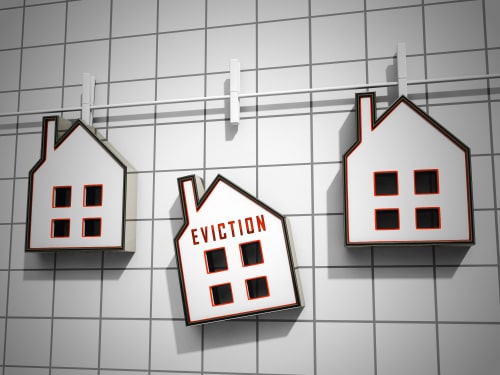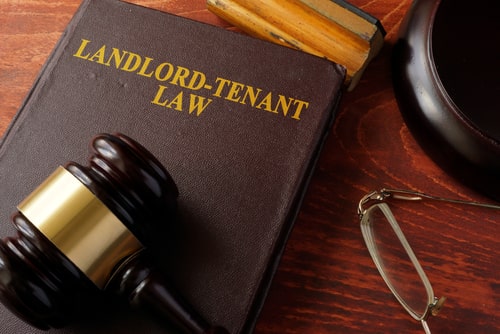
The moratorium on evictions is now extended through June 30, 2021. Landlords are left to wonder, is there any end in sight? The answer is a complex and uncertain one. Since the CDC eviction ban has already been extended multiple times, what can a landlord do?
According to Moody Analytics, an estimated 7 million households owe a collective $40 billion in the back due rent, fees, and utilities across the nation. Sadly, this is a reality that hits both the tenants facing job loss and possible homelessness but also the mom-and-pop landlords that rely on steady rental income to pay their mortgage. So far, federal and state aid programs have fallen short of bringing relief to both sides of the struggle.
Many landlords, tenants, and industry professionals found the 17-page CDC eviction ban to be confusing. So, continue reading below as we review the CDC eviction ban basics, the rights of homeowners, and how recent cases are changing the way the courts view moratorium guidelines.
What is the CDC Eviction Ban?
Initially, a federal ban on evictions protected tenants living in properties subject to federally backed mortgages or government funding. However, once that order expired, the CDC eviction ban began on September 4, 2020. The original expiration date was set for December 31, 2020, but as we mentioned above, that date has moved several times to the current expiration of June 30th.
The idea behind it is to ultimately support reducing the spread of COVID-19 by keeping tenants in place. In fact, the order is titled – Temporary Halt on Evictions to Prevent the Further Spread of COVID-19. In part, the order reads as follows –

- “The conditions that originally necessitated the original Order continue to exist and, in many jurisdictions, have significantly worsened. With the convergence of COVID-19, seasonal influenza, household crowding, and transmission, and the increased risk of individuals sheltering in close quarters in congregate settings such as homeless shelters, which may be unable to provide adequate social distancing as populations increase, extending the temporary halt on evictions, subject to further extension, modification, or rescission, is appropriate.”
However, the orders fall short in acknowledging the financial hardship and confusion regarding evictions for non-payment. Along with the CDC eviction ban, frequently asked questions on the moratorium page is available for added guidance. That said, much is still left up to local jurisdictions to interpret.
Does the CDC Eviction Ban Protect Every Tenant?
Who is covered under the CDC eviction ban continues to be a source of frustration, confusion, and debate between landlords and tenants. That said, the CDC does lay out some basic criteria for who the orders do or do not apply to. To qualify, the tenant must provide their landlord with a written declaration that they meet the CDC guidelines for protection based on the set list of factors. Let’s take a look at these qualifications below –
- Tenant(s) has made every effort to obtain all applicable government assistance for rent or housing.
- The resident(s) earned no more than $99,000 as an individual or $198,000 if filing jointly during 2020
- Tenant(s) anticipate earning no more than $99,000 in annual income as an individual, or $198,000 jointly in 2021
- An individual who was not required to report any income in 2020 to the IRS or received an Economic Impact Payment
- Individual(s) unable to pay the full rental amount due to a substantial loss of household income, loss of compensable hours of work or wages, a lay-off, or extraordinary out-of-pocket medical expenses
- Tenant(s) are using best efforts to make on-time partial payments as close to the full amount as the tenant’s circumstances allow (considering other nondiscretionary expenses)
- An eviction will likely force the tenant(s) to live in close quarters or render the tenant(s) homeless due to no other available housing options.
Is There a Way Around the Eviction Moratorium for Landlords?
As the CDC eviction ban extended into the Summer, persistent landlords desperate for relief themselves find ways around it. Keep in mind, the eviction ban centers around financial hardship brought on by the pandemic that halted and disrupted many people’s livelihoods.

That said, this does not apply to every tenant in every situation. Thus, allowing landlords and lawyers to search for any other reason to seek eviction legally. Furthermore, both landlords and tenants need to understand that the orders do not abate the rent due per the lease agreement even if not evicted. Additionally, it does not stop landlords from filing eviction cases, suing for monetary damages, or sending notices to vacate. Let’s look at the legal reasons under the eviction moratorium that allow landlords to still file to get tenants out.
Reasons to Legally Evict a Tenant During the Pandemic
- Tenant(s) Engage in Criminal Activity
- The Resident(s) Threaten the Safety or Health of Other Residents or Neighbors.
- Remaining in the Property Poses a Significant Risk of Property Damage
- Tenant(s) are Violating Health Regulations, Building Code, or Other Regulations that Affect Health or Safety
- The Tenant(s) Violated the Lease (excluding non-payment of rent or fees)
While these provisions are helpful to some landlords, on a large scale, the above actions may not apply. So, landlords have turned to another option to justify eviction – holding over.
How Tenant Holdover Justifies a Legal Eviction
Typically, a residential lease is 12 months. Thus, many tenants have come up for renewal during the pandemic at one point or another. So, landlords have gotten around the eviction ban is to issue a notice of non-renewal. If the tenants do not move out by the end of their current lease term, they are now considered “holding over.” Each state defines a holdover tenant slightly different; check out these examples below from Maryland, Pennsylvania, and Virginia below –
- Maryland: “A holdover tenant refers to a tenant who remains in possession of leased premises after the expiration of the lease term and when the landlord wishes to repossess the leased premises.”
- Pennsylvania: “A holdover tenant is an individual who “unjustifiably refuses to surrender possession of leasehold premises at the end of the term of the lease.”
- Virginia: “A “holdover tenant” is one who remains beyond the original lease agreement without obtaining consent from his/her landlord.”
During the CDC eviction ban, landlords have found ways to use non-renewal holdovers as a justifiable eviction. That said, even if a tenant holdover situation applies to your rental property, that does not mean an end is near. In fact, as many courts face a tremendous backlog of cases, even legitimate proceedings are slow-moving.
Furthermore, even if granted an eviction order, the process to physically remove the tenant with the sheriff could also take longer than usual. This process may face a backlog as well as restrictions due to social distancing and other factors. That said, a light at the end of the tunnel is still light – even if the tunnel is a long one.
Tips for Landlords Navigating the CDC Eviction Ban
One of the best steps a property owner can take is to partner with industry and legal experts. Our government, states, and local jurisdictions face unprecedented times, and there is no simple fix. For landlords, sticking to the letter of the law is critical to avoiding fines and possible litigation. Check out a few of our tips for dealing with the eviction ban below –

- Seek Qualified Legal Advice – As we mentioned, these are unprecedented times. Therefore, knowing your rights as a landlord is not as black and white as many would like it to be. So, consider contacting a qualified legal professional familiar with landlord-tenant law to review your specific situation and provide guidance.
- Open the Lines of Communication – Start a dialogue with tenants and figure out what their situation is. In some cases, you may be able to reach a separate payment agreement to make up for lost rent or offer additional resources to benefit both parties.
- Continue to File for Qualified Evictions – The CDC eviction ban protects most non-paying tenants from eviction based on financial hardship. However, there are many other reasons to evict, and landlords may still file in court on those grounds.
- Consider Suing for Rent – Just because a landlord cannot evict based on non-payment does not mean the tenant does not owe the back rent. Therefore, consider suing the tenant for the rent in small claims court instead of for eviction.
- Lean on Professional Property Managers – Navigating filings, handling tenant negotiations, and keeping up with changing guidelines can feel like a full-time job. So, why not leave it to the professionals? A qualified property manager can take over for you and protect your interests.
 What Happens Now and How Courts are Fighting Back
What Happens Now and How Courts are Fighting Back
The moratorium on evictions kept many financially strapped tenants in their homes throughout the pandemic. Now, with the CDC eviction ban expiration date looming, courts across the country are fighting back. In recent groundbreaking cases that experts say are only the beginning, some district courts have decided that the government has overstepped its authority by halting evictions. Essentially, the court says that the government does not have the power to regulate the landlord-tenant relationship in this manner.
So far, Texas, Tennessee, and Ohio have all had similar rulings that allow evictions to proceed despite the CDC orders. However, the government is appealing these decisions. Nonetheless, the rulings have left many landlords confused and a huge number of tenants vulnerable to the reality of homelessness. For instance, in places like Memphis, TN, evictions have seen a spike since the judges ruling last month.
That said, whether the court strikes down orders or they reach their expiration, a wave of evictions is sure to follow. Industry experts agree that these rulings are just a small taste of what is to come. After all, the precedent is now set.
Can Property Management Help Protect My Rental Interests?
When it comes to protecting your investment property, navigating changing regulations is a daunting task. Additionally, owners face devastating fines and possible jail time for defying the CDC eviction ban. Thus, changing the situation from unprecedented to downright scary.
With most owners cutting costs, hiring a property management firm may not be a priority. However, it is important to remember the value of relying on industry experts during this critical time for owners. At Bay Property Management Group, we see both sides of the pandemic fallout. Our dedicated team works to bridge the gap between landlords and tenants.
Whether you are struggling to remove a tenant or are trying to limit vacancy time, give us a call today. Our team can provide a free, no-obligation rental home analysis and help you see how property management companies in Philadelphia can protect your investment.

 What Happens Now and How Courts are Fighting Back
What Happens Now and How Courts are Fighting Back